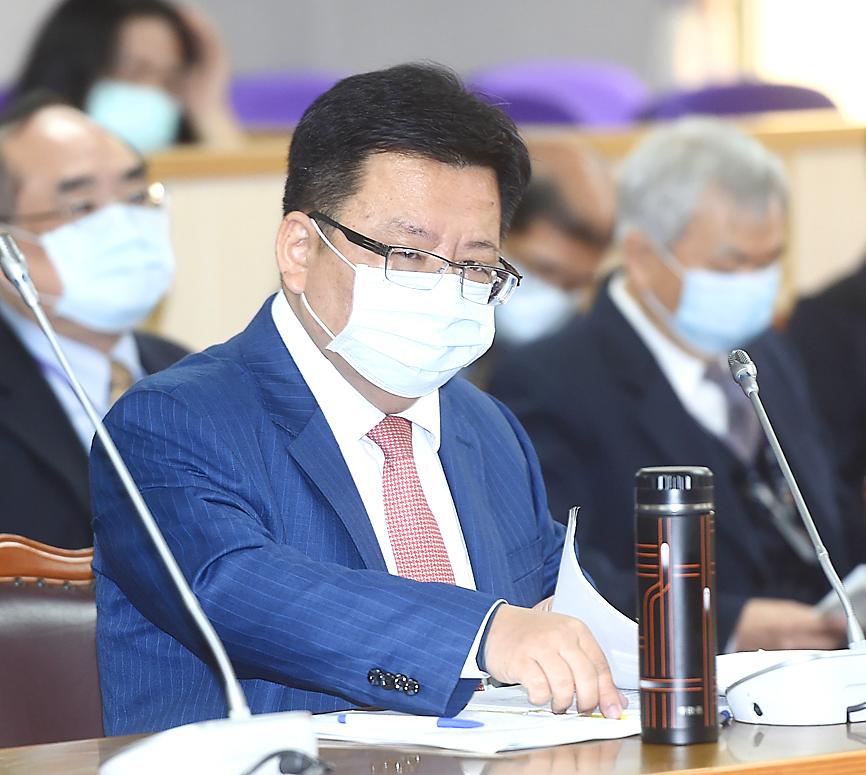The Presidential Office’s information security budget would be increased by 50 percent next year, as it faces an overwhelming 400,000 cyberattacks per month on its computer systems, officials said yesterday.
The legislature’s Judiciary and Organic Laws and Statutes Committee yesterday held the latest in a series of meetings examining annual budgets for next year, during which legislators raised the issue of information security.
As part of its budget for next year, the Presidential Office allocated NT$38.97 million (US$1.37 million) to “administrative work for preserving information security.”

Photo: Chien Jung-fong, Taipei Times
The funds would go toward software and equipment to defend the office’s computer systems against malware and information leaks, Presidential Office Deputy Secretary-General Lee Chun-yi (李俊俋) said.
As a government agency, the office is required to protect its information, as stipulated in the Information and Communication Security Management Act (資通安全管理法), he said.
The office’s cybersecurity budget is about NT$13 million more than was budgeted last year, he said, adding that it was also allocating NT$733,000 to research and develop a better cybersecurity plan.
Ho Chuan-te (何全德), who is in charge of cybersecurity at the Presidential Office, said that it would take a more proactive approach regarding cyberdefenses.
The office would focus on installing antivirus software more widely and better equipping the server room, he said, adding that it would invite researchers to advise on how to prevent attacks form cyber blackmailers.
The government has also required that all computer systems and mobile devices used by government employees be Taiwanese brands, and prohibited the use of Chinese-made devices, he said, adding that all servers used by the Presidential Office follow the Ministry of National Defense’s specifications.
The office would introduce more stringent specifications for private mobile devices used by office personnel, he added.
Meanwhile, Chinese Nationalist Party (KMT) Legislator Lee Guei-min (李貴敏) said that the increased budget should be discussed further, proposing that the NT$733,000 for research be cut from the budget pending discussion.
Separately, Democratic Progressive Party Legislator Liu Shyh-fang (劉世芳) said that NT$500,000 of the budget should be frozen, but the proposal was dismissed.

Taiwan is stepping up plans to create self-sufficient supply chains for combat drones and increase foreign orders from the US to counter China’s numerical superiority, a defense official said on Saturday. Commenting on condition of anonymity, the official said the nation’s armed forces are in agreement with US Admiral Samuel Paparo’s assessment that Taiwan’s military must be prepared to turn the nation’s waters into a “hellscape” for the Chinese People’s Liberation Army (PLA). Paparo, the commander of the US Indo-Pacific Command, reiterated the concept during a Congressional hearing in Washington on Wednesday. He first coined the term in a security conference last

A magnitude 4.3 earthquake struck eastern Taiwan's Hualien County at 8:31am today, according to the Central Weather Administration (CWA). The epicenter of the temblor was located in Hualien County, about 70.3 kilometers south southwest of Hualien County Hall, at a depth of 23.2km, according to the administration. There were no immediate reports of damage resulting from the quake. The earthquake's intensity, which gauges the actual effect of a temblor, was highest in Taitung County, where it measured 3 on Taiwan's 7-tier intensity scale. The quake also measured an intensity of 2 in Hualien and Nantou counties, the CWA said.

The Overseas Community Affairs Council (OCAC) yesterday announced a fundraising campaign to support survivors of the magnitude 7.7 earthquake that struck Myanmar on March 28, with two prayer events scheduled in Taipei and Taichung later this week. “While initial rescue operations have concluded [in Myanmar], many survivors are now facing increasingly difficult living conditions,” OCAC Minister Hsu Chia-ching (徐佳青) told a news conference in Taipei. The fundraising campaign, which runs through May 31, is focused on supporting the reconstruction of damaged overseas compatriot schools, assisting students from Myanmar in Taiwan, and providing essential items, such as drinking water, food and medical supplies,

New Party Deputy Secretary-General You Chih-pin (游智彬) this morning went to the National Immigration Agency (NIA) to “turn himself in” after being notified that he had failed to provide proof of having renounced his Chinese household registration. He was one of more than 10,000 naturalized Taiwanese citizens from China who were informed by the NIA that their Taiwanese citizenship might be revoked if they fail to provide the proof in three months, people familiar with the matter said. You said he has proof that he had renounced his Chinese household registration and demanded the NIA provide proof that he still had Chinese